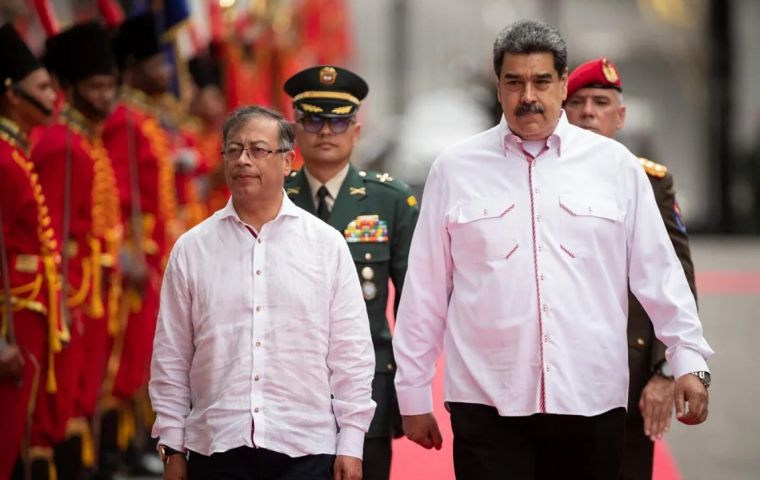MercoPress. South Atlantic News Agency
Petro proposes “Political Peace” Agreement for Venezuela post-elections
 Petro discussed the matter with Brazilian President Lula da Silva in Bogotá, who gave his approval
Petro discussed the matter with Brazilian President Lula da Silva in Bogotá, who gave his approval Colombian President Gustavo Petro has received a draft proposal aimed at establishing “political peace” in Venezuela following its upcoming presidential elections. This text, developed by Petro’s ambassador in Caracas alongside diplomats from other countries, and businesspeople is expected to be sent to Venezuelan President Nicolás Maduro for consideration soon.
During a recent visit to Caracas, Petro expressed his concerns about Venezuela's political situation to Maduro, emphasizing the need for a display of democratic normality. According to sources, Petro suggested a “pact for peace,” to which Maduro responded, “Make the proposal and we will look at it.”
Petro discussed the matter with Brazilian President Lula da Silva in Bogotá, who gave his approval. Petro later announced the proposal publicly, envisioning a parallel plebiscite to the election that would guarantee the rights of all candidates. This idea was entrusted to Colombian Ambassador Milton Rengifo, who worked intensively for weeks to draft the proposal. The draft has now been reviewed by Petro, his close advisor Laura Sarabia, and Foreign Minister Luis Gilberto Murillo.
The proposal, if accepted by Maduro, would commit both Chavismo and the opposition to respect the election results and avoid any post-election violence or constitutional manipulations. This assurance to the international community aims to ensure a peaceful transition of power if the opposition wins.
Recent actions by Maduro's government have been mixed. While opposition representative Edmundo Gonzalez has been allowed to compete, followers of the opposition leader Maria Corina Machado have faced imprisonment, and establishments serving her have been targeted.
The initial draft proposed a plebiscite to coincide with the election, featuring questions designed to resolve the political conflict. However, due to time constraints, the Colombian Foreign Ministry suggests a political agreement be signed instead. Rengifo’s draft, informed by consultations with university rectors, analysts, businessmen, and the embassies of Brazil, Chile, and Mexico, includes five key points. These address sanctions, disqualifications for the upcoming elections, the reinstitutionalization of the country, the defense of the Essequibo, and the monitoring of the agreement’s implementation—many elements being continuations of the Barbados agreement.
If Maduro accepts and signs this agreement, Venezuelans would vote on it during the presidential elections, pending technical preparations by the National Electoral Council before June 10.
The document currently circulating in the Casa de Nariño could be pivotal in achieving political stability in Venezuela. However, its success hinges on Maduro’s acceptance, making the situation a high-stakes for the political stability of the region in the future.




Top Comments
Disclaimer & comment rulesCommenting for this story is now closed.
If you have a Facebook account, become a fan and comment on our Facebook Page!